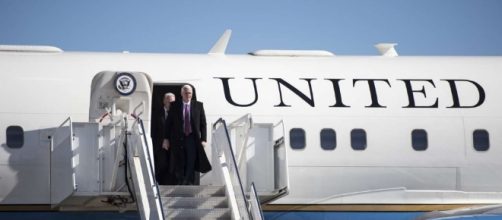US Vice President Mike Pence met with Japanese Prime Minister Shinzo Abe on Tuesday in the context of the rise in concerns over North Korea's nuclear program.
Pence reiterated the importance of the Tokyo military alliance between Japan and the United States for peace and security in the midst of the North Korean nuclear threat.
"The alliance between the US and Japan is the foundation of peace and security in Northeast Asia," said Pence in a meeting with Japanese Prime Minister Shinzo Abe after his arrival in Tokyo, Reuters reports.
The US seeks peaceful solution
During his visit to the demilitarized zone on the border of South and North Korea on Monday, he said that The North Korea is testing The United States patience, but added that the United States is trying to establish security by peaceful means.
Pence also warned Pyongyang not to examine the determination of President Donald Trump and the power of the US armed forces in the region. Trump has sent US warships to the Korean peninsula, while Pyongyang reportedly plans to conduct another nuclear test, according to Reuters.
In New York, a deputy North Korean ambassador Kim Ryong And warned on Monday that nuclear war could break out at any time on the Korean peninsula, accusing the US of "dangerous saber-rattling".
North Korea failed in an attempt of firing a ballistic missile on Sunday, a day after Pyongyang marked the 105th birth anniversary of the late leader and founder, Kim Il Sung. Last year, North Korea raised the number of nuclear and missile programs, conducted two nuclear tests and launched 20 ballistic missiles.
It is expected that Pence and Abe will invite China to encourage North Korea to self-control.
Chinese foreign minister called for a peaceful resolution of tensions
The situation on the Korean peninsula "is very sensitive and dangerous," said a spokesman for the Chinese Ministry of Foreign Affairs Lu Kang at a regular news briefing on Monday. When asked whether the recent tensions between China and North Korea have increased, Lu said that China and North Korea are "friendly countries that still have regular contact."
A Chinese foreign Minister requested a meeting with North Korean counterparts.
However, Reuters notes that Bloomberg reported on Monday that North Korea did not respond to the senior Chinese diplomats this month. The special Chinese envoy for the North Korean nuclear program, Wu Dawei, also did not receive a response regarding a meeting.
A spokesman Lu Kang said he was also against setting up a missile system THAAD in South Korea. China believes that THAAD radars are a threat to their safety. South Korean President Hwang Kyo-Ahn and US Vice President Mike Pence confirmed the plans on the deployment of the system on Sunday.

